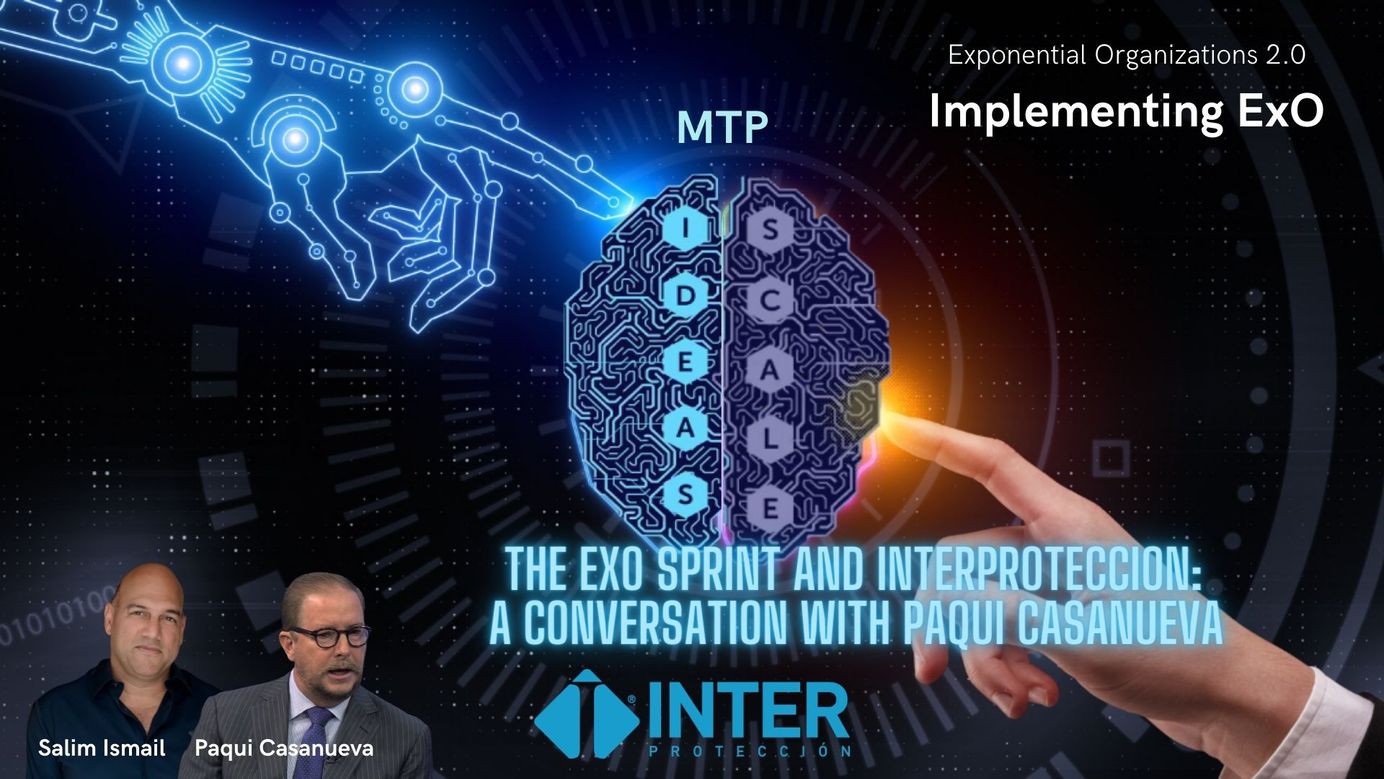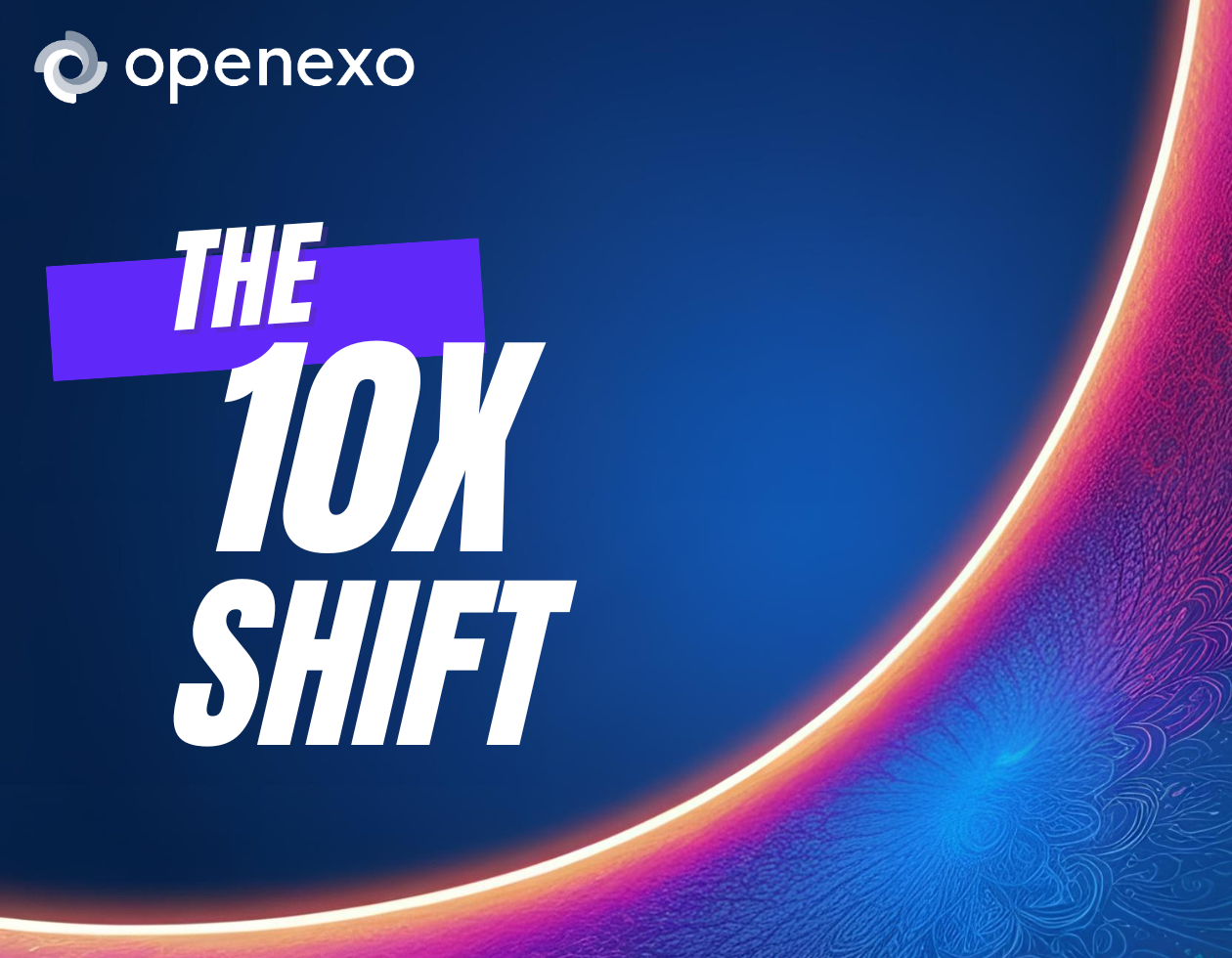
The ExO Sprint and Interproteccion: a conversation with Paqui Casanueva
To change the culture where you launch a completely new product from scratch in 72 hours and have massive signup means it has to have a massive impact. Every person in the organization operates in a very agile, nimble way and responds very quickly.
At a recent collaborative event for the second edition of Exponential Organizations, Paqui Casanueva, President at Interproteccion, spoke on the virtual stage with Salim Ismail and Peter Diamandis during the opening session on Implementing an ExO. Below are highlights along with videos from that conversation.
Procter and Gamble was the first organization to go through an ExO Sprint. During the pilot program, Salim and his team asked if they could transform legacy, culture, management, leadership, and mindsets and move it forward in 10-weeks. That was the challenge. Can they hack culture at scale in a big company? Can big companies adopt disruptive innovation? During the pilot, Tony Saldana and Linda Clement-Homes, CIO at Proctor and Gamble, took on this challenge. The results from the sprint got them close to a billion dollars of value that they would not have achieved if they hadn't run the sprint.
Since then, ExO Works, a Strategic Partner with OpenExo has run more than 35 sprints with companies like Black and Decker, HP, Visa, Vodacom, etc., and another 30+ via the ecosystem. There have also been others outside the community that have run the sprint themselves. The average return on investment is about 70X.
Now we turn to Paqui Casanueva, President at Interproteccion, who runs the biggest insurance company in Mexico, and his experience running an ExO Sprint.
Salim: How did it move your leadership culture management thinking three years ahead in 10 weeks?
Paqui: I read the first book of Exponential Organizations, and I was super impressed. I was attracted to the ideas yet didn’t know how to execute them within our company. Then I met Salim, and he told me about ExO Sprints. We were the first ones outside the USA.
When Salim explained the process of making the ExO Sprint, I knew that’s what we were looking for. For me, that was walking the walk and talking the talk. We did these 10-week sprints. The culture blew it apart. It was an opportunity to form a new culture with a totally different point of view and focus on the future and another drive.
Salim: So it changed the mindset fundamentally. I remember you also said you’d doubled revenues and triple profits since then.
Paqui: I suppose that even though we suffered from the pandemic last year, we have been growing fivefold since the sprint. It shook the tree out and everybody. Shifted mindsets, and everyone was focused on the way to resolve these problems.
Here’s an example: when COVID started here in Mexico in March 2020, we assembled a team that we learn in the extra sprint, and in 72 hours, I called an insurance solution for the clients, prospects. Within 90 days, we sold almost half a million policies.
It sounds like quite a challenge, but I have to be honest, even though InsureTech speaks of high speeds, the insurance industry is still one of the most legacy areas on the economic horizon.
Salim: COVID hits. You create a new COVID insurance product in 72 hours, and you have half a million customers within a few months.
Paqui: 90 days
Salim: That’s mind-blowing. If anybody knows the insurance industry, launching a new product typically takes a year; forget months, days. That's unbelievable.
Paqui, you did the same thing with the earthquake. I'd love for you to talk to the community about that. You got other insurance companies together, right? Tell us about them.
Paqui: I suppose that what we did for COVID was a similar rebuild for the experiment that we did in 2017. Here in Mexico, we experienced a massive earthquake on the 19th of September, 2017.
What we put together in 72 hours was a super SWAT team. We developed a homeowners policy to cover everyone here in Mexico. The penetration of the insurance market is relatively low. So almost 90% of the people are not covered. So we put together the product in 72 hours and a chatbot through Facebook that was placing all the insurance. Through our not-for-profit organization, the foundation, we were willing to give out 10,000 homeowners policies.
We thought that these would deploy in 30 or 40 days, but within the first 72 hours, we placed the 10,000 policies together. So that was the first kind of experiment that was pushed through as a result of the crisis. Now we have learned the way to respond speedily during a crisis. We were able to capitalize on it even now during the COVID situation.
Salim: I’m just going to restate this. Insurance is a very old model. It's been around for hundreds of years. People have very static, established processes. They do long actuary tables to work out whether a product will work. Is it financially viable? It's many years of risk management. An actuarial scientist is the original data scientist. They do long-term models.
To change the culture where you launch a completely new product from scratch in 72 hours and have massive signup means it has to have a massive impact. Every person in the organization operates in a very agile, nimble way and responds very quickly. Right. This is a profound commentary.
Can we interview you for the second edition Paqui and just talk through some of what you've been through so that we can include some of this material in the second edition of the book right?
Paqui: I'll be glad to help in any way.
Salim: You also created an incubator for Interproteccion. How is that going?
Paqui: One of the byproducts of the ExO Sprint was to create a lab or an incubator. We split into two. It has matured a lot.
The lab operates on its own, not at the edge of the organization but as part of the organization. So we created an investment vehicle to invest in the technologies or business models that we think are attractive and could impact our operations. The lab is doing great. The fund invests in many technologies and different business models that are affecting our way of doing things.
Salim: Paqui, where do you see the future of insurance? Because I have an idea, but I wanted to bounce it off you specifically. How do you see the future of the insurance world playing out in a world that's changing so fast? How do you manage that side of it?
Paqui: It's a good thing to be speeding up when everyone is talking about speed. If you started, you're at a higher speed than the rest. We have to continue exponentially raising the bar. And I suppose that we have to change insurance from the bottom up. As a consumer of insurance, not as an insurance guy, I would love to have just one policy, pay one premium, and have all my risks covered for one year or multiple years. I suppose we are pushing for that in a disruptive or innovative way. There’s a lot to do, a lot of work to get things done. We are keeping ourselves happy while focusing on the next two to four years.
Salim: Excellent. Are the innovation and incubation efforts you're doing, are they externally facing, or are they servicing the company’s needs? My guess is they're externally facing, looking at adjacent industries, et cetera, correct.
Paqui: That's right. At first, we were envious, and we were keeping the lab just for ourselves. Still, the creativity there was so big that we kept pounding offers from focusing on other industry-sense solutions. The mature thing was to decide and keep the lab focusing on whatever creativity could lead to.
Salim: Wonderful. The next question comes from Chander in India, Why are other insurance executives and businesses so slow?
Paqui: I suppose that insurance is based on long-term horizons. If you decide now, it's difficult to realize the ripples you're going to have in five, 10, or 20 years. And I suppose insurance is still based on a non fail environment. The risk of making a wrong decision is such a big liability that not everybody takes or is willing to make the decisions or risks. The immune system in insurance is so high; I would like to have the immune system of insurance in my body to judge COVID.
Salim: Wonderful. I've got a perception as to what I think the future of insurance is. I want to get your feedback as somebody in the industry. When I look at drones, the technology in drones is changing so fast that the government doesn't have time to regulate it. And by the time they regulate it, the regulation is out of date.
We see this already in the healthcare world; by the time the FDA regulates a drug, the drug is out of date. This is a huge structural issue. I’ve got a thesis as to what happens. I think the insurance industry will go to the government and say, okay, Mr. Government, you cannot regulate these domains. Why don't you let us handle it? We have an economic model and a risk model. We will say to the drone company that you can do whatever you want with it as long as you can get liability insurance for your application. Still, you have to obtain liability insurance first.
Then they come to you, and you find the model that works. It makes it a more nimble environment. I can't see how we won't get there. Tell me what your feedback.
Paqui: I suppose you're right. The business models move faster than the relation, not only in insurance but in each and every aspect of the economy.
Regulators can view these business models as a kind of a credit bureau that does the underwriting prior to the regulation. If somebody is willing to risk their capital to ensure risk, they're eager to comply with the regulations and with everything. These pieces are turning around a bit because of the fast pace of innovation.
Salim: Yeah. Jim Harris has posted a video on this. He's one of the global experts on drones for interested folks. Paqui, thank you so much for joining us. Thank you for the incredible trust in us for helping with the taking on the sprint. And a huge congratulations on applying it in the way that you have. You've now taken what we worked on as a cultural change but applied it to the earthquake industry, to COVID insurance. And you are massively changing Mexico in the social fabric of Mexico, where people are feeling safer, which is what insurance is all about. That's a huge thing that you're doing for the entire country. Thank you so much for being with us and for everything that you do.
Paqui: No, thank you, Salim.
You can catch the 20-minute clip here
From the outcomes of the sprints came a second book, Exponential Transformations, written by Francisco Palao, Michelle Lapierre, and Salim Ismail. This is essentially a workbook that any single company can pick up and run a sprint in their company without any help. Salim Ismail comments, "our thesis is that every organization in the world has to go through that process with or without us. If they don't change their fundamental cultural mindset, they can't move the company forward, and they're stuck in a political environment."
Exponential Organizations 2.0 is coming out later this year. In the updated version, you’ll find more insights from Paqui Casanueva as well as dozens of other updated and new case studies. There are new chapters on government, economy, lessons learned, and a chapter per attribute and MTP. You can purchase your copy here.
ExO Insight Newsletter
Join the newsletter to receive the latest updates in your inbox.









